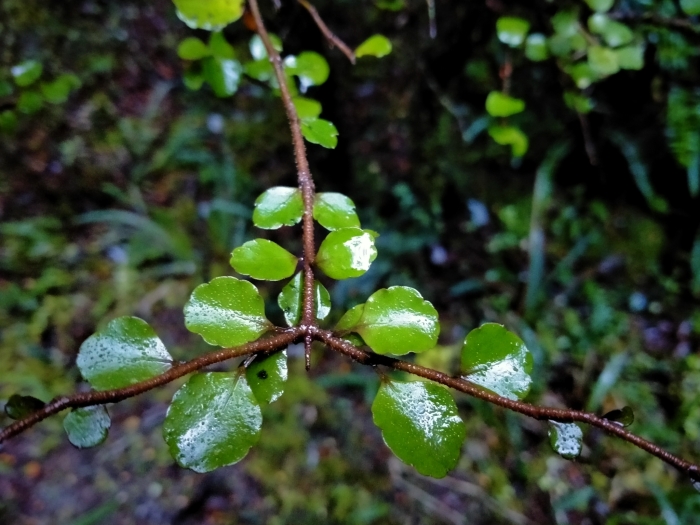Horoeka
(Raukaua anomalus)
Horoeka (Raukaua anomalus)
/
/

John Barkla
CC BY 4.0
Image By:
John Barkla
Recorded By:
Copyright:
CC BY 4.0
Copyright Notice:
Photo by: John Barkla | License Type: CC BY 4.0 | License URL: http://creativecommons.org/licenses/by/4.0/ | Rights Holder: John Barkla | Publisher: iNaturalist | Date Created: 2021-05-02T10:07:08-07:00 |




















































Estimated Native Range
Summary
Raukaua anomalus, commonly known as Horoeka or Seven Finger, is an evergreen shrub native to the cool temperate rainforests, lower montane forests, and subalpine scrublands of New Zealand. It can grow up to 3 meters tall and is characterized by its small, glossy, leathery leaves that are 1–3 cm long and alternately arranged along the densely divaricating branches, which create a complex interwoven appearance. The plant produces inconspicuous green-white flowers along its branches from November to January, which are followed by small (5 mm) white berries with purple marks that are attractive to birds.
Raukaua anomalus is valued for its unique branching structure and foliage, making it an interesting specimen for gardeners who appreciate textural plants. It is often used in native plantings, urban gardens, and as a background shrub in mixed borders. It is relatively low maintenance, requiring medium amounts of water and thriving in well-drained soils. While it prefers full sun, it can also tolerate part shade, making it versatile for different garden settings. It is not commonly affected by diseases, but it can be prone to root rot if planted in poorly drained soils. Gardeners should be aware that it may not be readily available in all nurseries, but it is worth seeking out for its unique aesthetic and ecological value.CC BY-SA 4.0
Raukaua anomalus is valued for its unique branching structure and foliage, making it an interesting specimen for gardeners who appreciate textural plants. It is often used in native plantings, urban gardens, and as a background shrub in mixed borders. It is relatively low maintenance, requiring medium amounts of water and thriving in well-drained soils. While it prefers full sun, it can also tolerate part shade, making it versatile for different garden settings. It is not commonly affected by diseases, but it can be prone to root rot if planted in poorly drained soils. Gardeners should be aware that it may not be readily available in all nurseries, but it is worth seeking out for its unique aesthetic and ecological value.CC BY-SA 4.0
Plant Description
- Plant Type: Shrub
- Height: 6-8 feet
- Width: 10-12 feet
- Growth Rate: Moderate
- Flower Color: Green, White
- Flowering Season: Spring, Summer
- Leaf Retention: Evergreen
Growth Requirements
- Sun: Full Sun
- Water: Medium
- Drainage: Fast
Common Uses
Border Plant, Low Maintenance, Potted Plant
Natural Habitat
Native to cool temperate rainforests, lower montane forests, and subalpine scrublands of New Zealand
Other Names
Common Names:
Scientific Names: , Raukaua anomalus, Pseudopanax anomalus, Nothopanax anomalus, Panax anomalus, Neopanax anomalus, Nothopanax microphyllus, Panax anomalus var. microphyllus, Panax microphyllus,
GBIF Accepted Name: Raukaua anomalus (Hook.) A.D.Mitch., Frodin & Heads